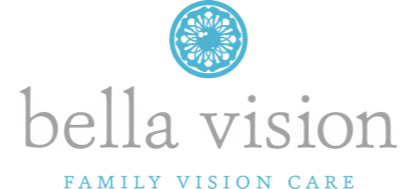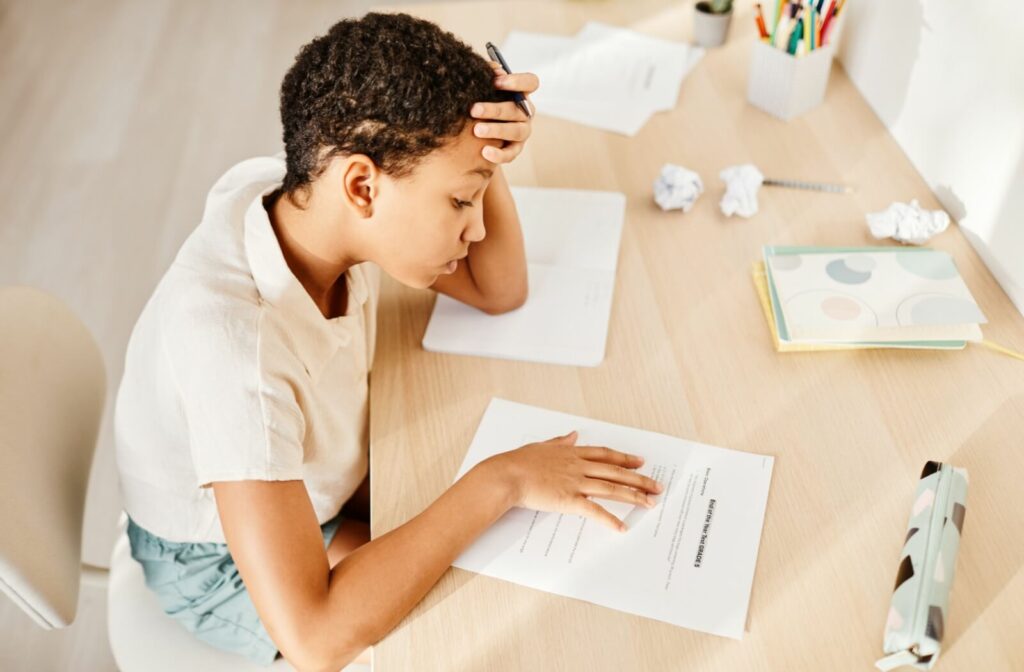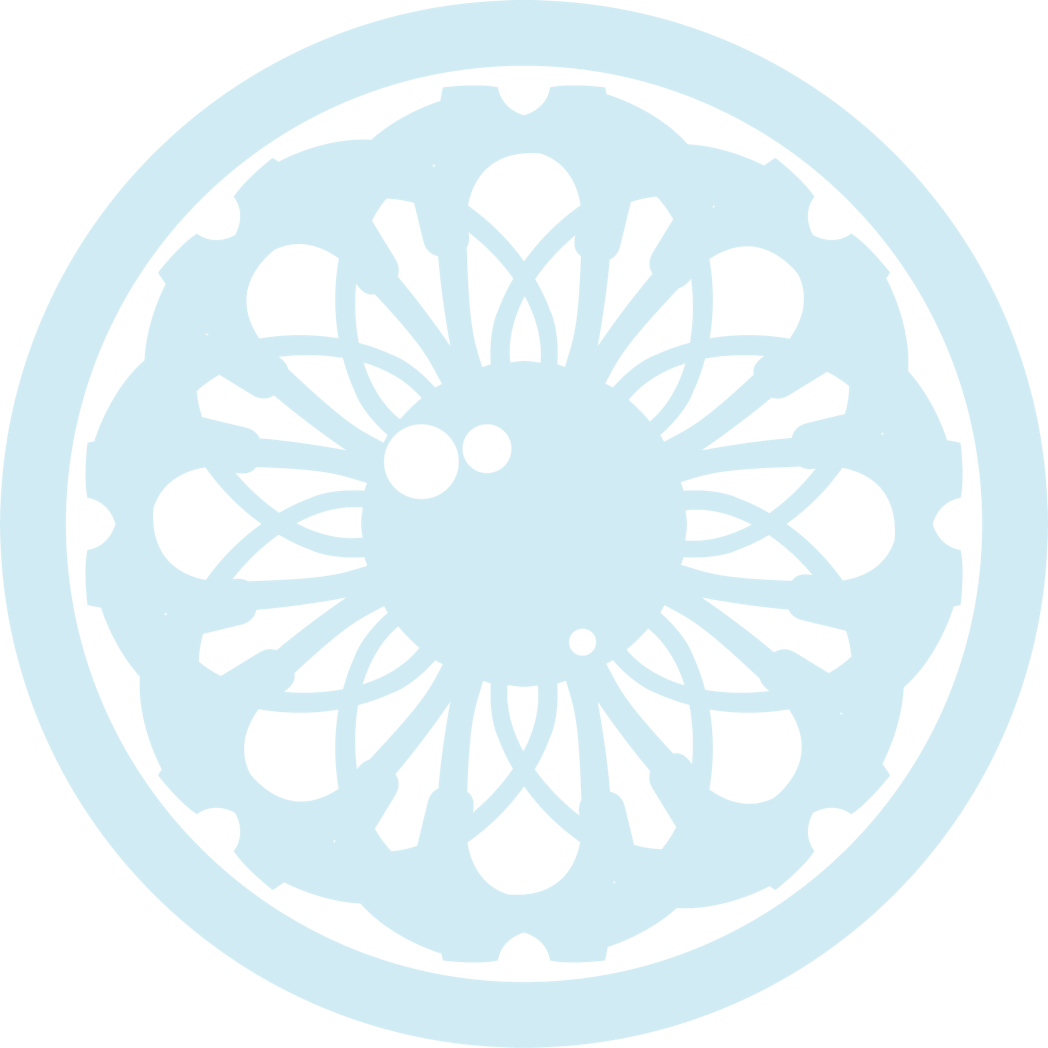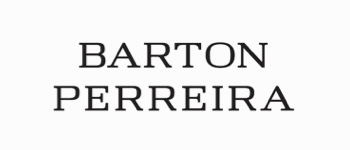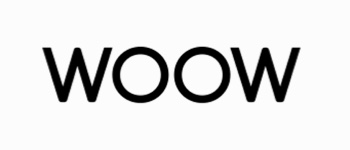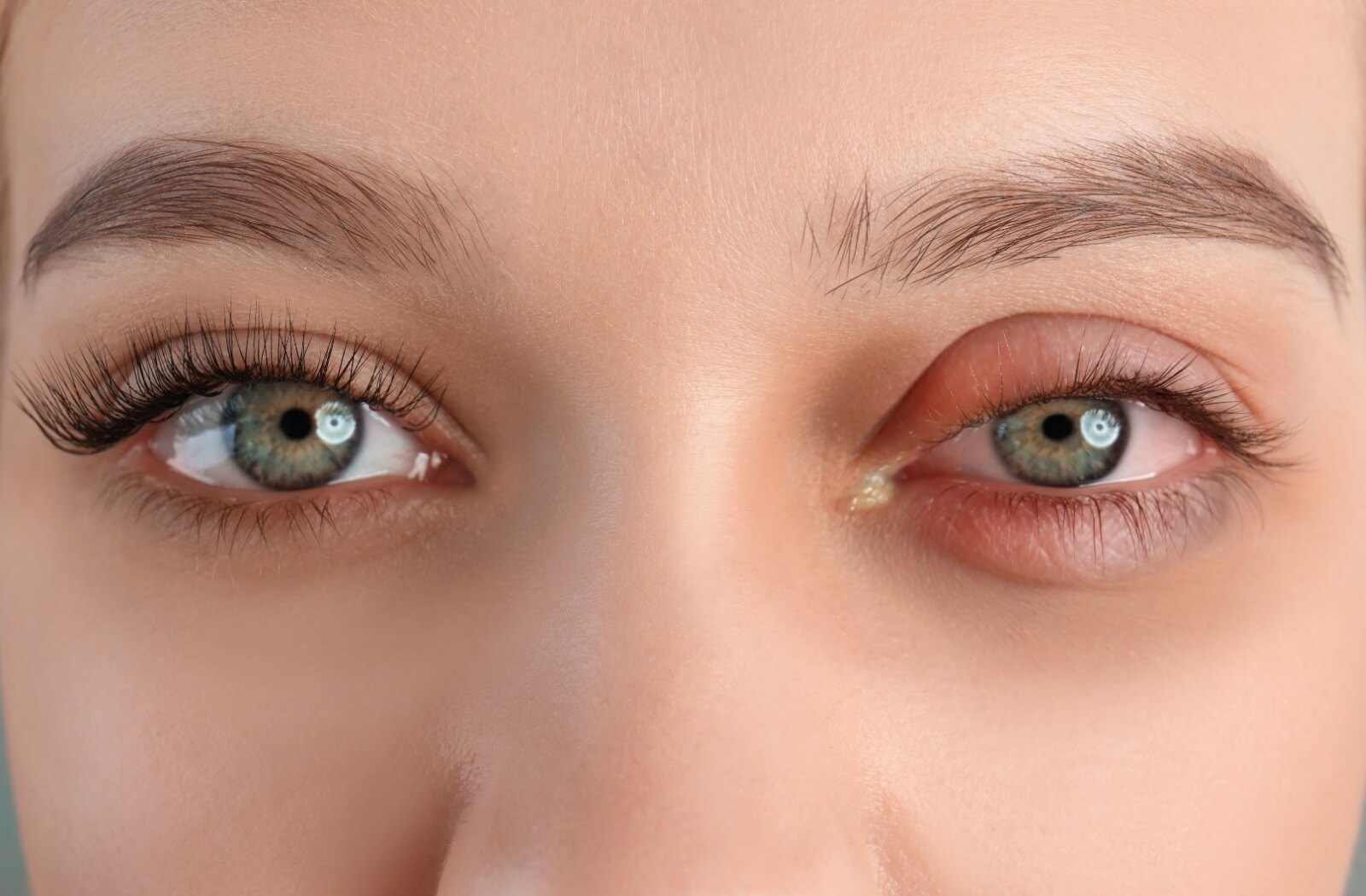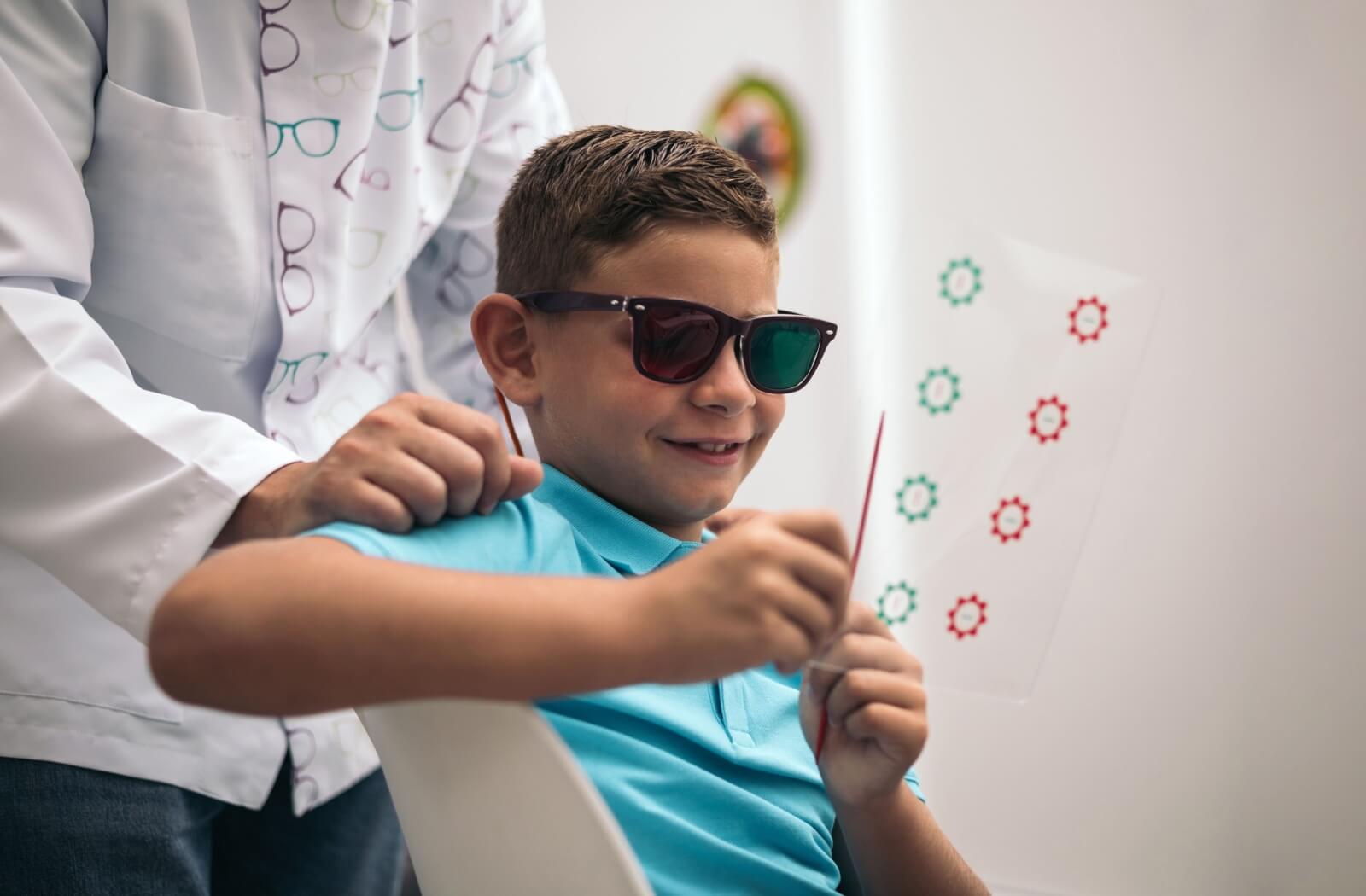Reading and learning are fundamental skills that shape a child’s future. Yet, many children face difficulties in these areas, affecting their academic progress. It’s natural to feel concerned when your child struggles, and often, the underlying cause isn’t immediately obvious. Many parents don’t realize that issues with reading and learning may stem from undiagnosed vision problems.
If your child is struggling with reading and learning, a comprehensive eye exam should be the first step in order to evaluate if there is a binocular vision problem that could be contributing. Treatments such as lenses, prisms and Optometric Vision Therapy can be prescribed by your optometrist in order to help your child not only see clearly, but be able to process what they are seeing.
Signs of a Vision Problem
It’s not uncommon for children to face challenges with reading and learning. After practicing for so many years and seeing so many children, I can say with confidence that each child will “get there” in their own way and time. But if you are noticing your child struggling in school with attention or comprehension, avoiding tasks, complaining of headaches, squinting or double vision, your child may also have a vision problem that is getting in their way of learning.
Binocular vision problems often disguise themselves as learning difficulties, making diagnosis difficult for those who are not familiar. For example, a child might skip lines while reading or struggle to retain information. These signs could mistakenly be attributed to issues like dyslexia or ADHD when the root cause is a vision problem. I tell parents who tell me there’s already a diagnosis for their child, that they can have a learning difference AND a vision problem. These issues are not mutually exclusive. The goal is to give your child the tools and guidance so that their vision problem does not interfere with learning or their achievements in life.
For some, recognizing that your child has a vision problem may be difficult. Children often do not have the language to explain what they’re experiencing, or they may simply assume the vision they have is how everyone sees the world. Comprehensive Eye exams are essential for just this reason, but you can watch for common signs of vision problems, such as:
- Frequent eye rubbing or blinking
- Short attention span for reading or writing
- Covering one eye
- Holding reading material close to the face
- Complaints of blurred or double vision
- Squinting
- Difficulty remembering what they read
- Poor hand-eye coordination
- Frequent headaches
- Excessive head and/or body movement when trying to read or sit still
Recognizing these signs early can help in seeking proper care and intervention, thereby improving your child’s overall learning experience and quality of life.
The Role of Vision in Learning
Vision plays a critical role in how children process information. About 80% of what children learn in school is through sight. Meanwhile, classroom time is getting more dynamic, with so much more visual information to take in. It can get overwhelming. So when their vision is compromised, it impacts their ability to read, comprehend, and engage with learning materials.
Basic visual skills necessary for effective learning include eye tracking, focusing, coordination and depth perception. There are also 16 Visual Perceptual skills required to make sense of the visual information coming into your brain – those include: visual spatial, visual motor and visual analysis skills, among others. If a child lacks these skills, they may struggle with reading fluency and comprehension. Addressing these issues can transform their educational experience.
What Is Vision Therapy?
Optometric vision therapy is a personalized program designed to correct binocular vision problems that interfere with learning, comprehension and activities of daily life. Unlike glasses or surgery, vision therapy aims to improve the brain’s processing of visual information. By using concepts of neuroplasticity, the patient learns to coordinate, move and process information from each eye more efficiently. This results in improvement of symptoms like double vision, blurred vision, headaches, reduced reading comprehension, etc. Optometric Vision Therapy is non-invasive and tailored to each patient’s specific needs. Conducted under a Board Certified optometrist’s supervision, vision therapy includes activities both in the office and at home that teach eyes and brain to work together more efficiently.
Vision therapy can help improve symptoms associated with:
- ADD/ADHD
- Autism and developmental delays
- Convergence insufficiency and double vision
- Nonverbal learning disabilities
- Poor spatial awareness
- Vision and reading
- Vision loss
- Visual-motor problems
- Visual stress headaches
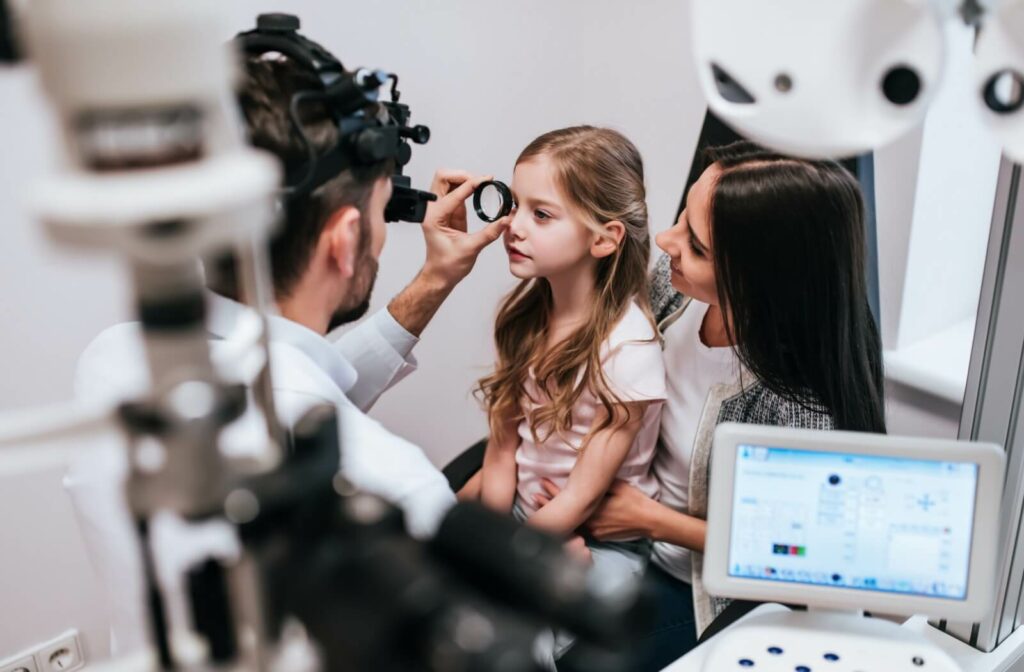
Benefits of Vision Therapy
Vision therapy offers numerous benefits for children grappling with reading and learning difficulties:
- Improved Reading Fluency: By enhancing visual skills, children can read more effortlessly and accurately.
- Better Comprehension: With improved vision, children are better able to understand and retain information.
- Enhanced Academic Performance: Correcting vision problems can lead to overall better performance in school, boosting confidence and motivation.
Children who complete vision therapy often show significant improvements in their reading abilities and academic success, making it a worthwhile investment for their future.
How Parents Can Help Children Succeed
Recognizing vision problems early is crucial. Parents can play a vital role in this process by being vigilant about their child’s behavior and performance. You have a lot of power in shaping your child’s future since untreated vision-related issues will typically worsen and impact more of their daily life. Look out for signs like squinting, frequent eye rubbing, or complaints of blurry vision.
If you suspect a vision problem, consult an optometrist specializing in vision therapy. We can conduct a comprehensive eye exam to determine if vision therapy is needed. A vision therapy program may include methods such as lenses, prisms, depending on your child’s specific vision problem. Early intervention can promote a smoother academic journey.
Vision Therapy for Academic Success
Vision therapy offers a proven solution by targeting the root causes of these challenges. By addressing vision problems, children can unlock their full potential and enjoy a more successful educational experience.
If you believe your child could benefit from vision therapy, don’t hesitate to reach out to our team at Bella Vision for a consultation. We can craft a treatment plan specifically for your child based on their needs and goals.Take our vision therapy questionnaire or contact us for a consultation. With so much to see, let’s get started immediately!
